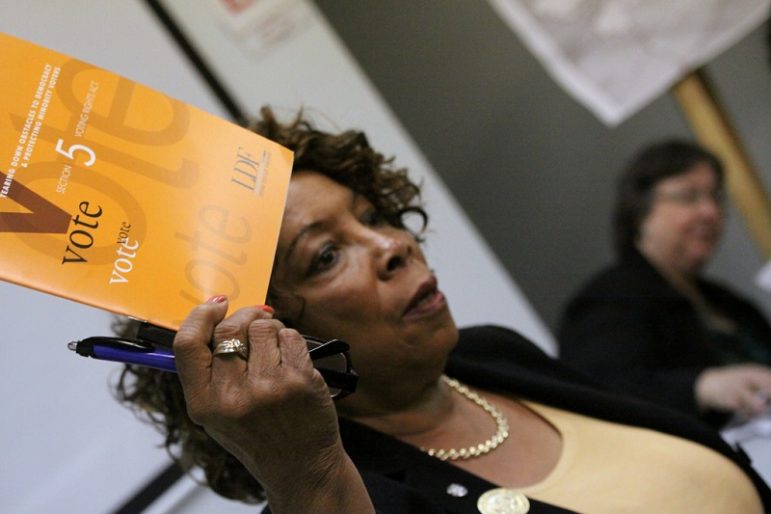
Some of the sense of helplessness many feel this New Year comes because too many nonprofits have relied for so long on national politics to deliver tangible benefits. While many nonprofit organizations have responded to calls to action from advocacy organizations like the National Low Income Housing Coalition, fewer have been actively promoting democracy in their daily practice.
During these next four years, the pathways to federal and state support are likely to be longer and narrower. Rebuilding your organization’s civic muscles may be required.
Civic muscle has two meanings.
- Increasing the capacity of your members, neighbors, and program participants to become “BIG I’s” and not just “little yous”; and
- Increasing your organization’s credibility where decisions are made because your members and program participants are articulate and tenacious.
Hollie Russon-Gilman offers some advice in two recent articles: “Rebuilding our Civic Muscles” and “Tech and Innovation to Re-engage Civic Life.” Ms. Russon-Gilman suggests:
- Volunteer and Talk with another Human Being IRL. Reports are great, but relationships in real life make change. Talking with folks, not talking at them, makes all the difference.
- Organize and Mobilize for Policy Change (Not Just Every Four Years). Local issues are often closest to the hearts of people with whom you work and live,
- Focus on Governance. Bringing more voices to the table can democratize the process of governing. Pry the sausage factory open so that legislators are afraid to make backroom deals. One example is the recent passage of the “unfair housing amendments” in the Ohio General Assembly.
Lets look more closely at each these recommendations:
Sign up for our free newsletters
Subscribe to NPQ's newsletters to have our top stories delivered directly to your inbox.
By signing up, you agree to our privacy policy and terms of use, and to receive messages from NPQ and our partners.
Relationships make change. Nonprofits can help their members or program participants overcome barriers to civic action by breaking through the noise that’s offered as “news” and the fear-mongering of mass media. As social helpers, nonprofits can help overcome the psychology of “learned helplessness” and the fear of being an “outsider.” Talking to your constituents about their needs and interests before suggesting an advocacy solution is important. When the “ask” becomes a part of the life of the individual, she or he is more likely to become engaged. Too often organizations take a wham-bam approach to legislative advocacy.
Act locally every day, not just nationally once every four years. Microdemocracy was originally a strategy for activists in third-world dictatorships in transition towards democracy. According to the Right Question Institute, microdemocracy is the idea that “ordinary encounters with public agencies are opportunities for individual citizens to ‘act democratically’ and participate effectively in decisions that affect them.” Old-timers may remember this concept from the 1960s when it was used by groups like Mobilization for Youth and the Welfare Rights Organization. In a recent article at the website Ars Technica, novelist Malka Older makes the case for microdemocracy in the U.S. of the future. Ms. Older says, “The solution to low voter turnout and political apathy is to get people to make their voices heard where public policy meets their direct interest and work their way up from there.” Nonprofits that are hosting candidate nights, periodic visits to local city council meetings, and public hearings are fostering civic engagement where it is most familiar.
A focus on governance, how laws and rules are made, is critical to civic engagement. Too often, government is slow and opaque, leaving citizens in the dark. Educating ordinary citizens in their expectations is another key role for nonprofits seeking to engage their constituents. High school civics classes rarely explain how the “sausage factory” really works. Regular and systematic interventions around specific issues can sustain participants over a series of long frustrating campaigns. In Ohio, advocates have been engaged in a ten-year effort to regulate “utility resellers,” landlords who purchase wholesale public utilities and then resell them to tenants at a markup with fees. In recent years, Ohio advocates have been through five proposed bills in the General Assembly and three investigations by the Public Utilities Commission. Each time a bill comes up for consideration or a request for testimony is announced, a growing number of tenants respond with their personal stories. To be sure, government doesn’t make this kind of engagement easy. The labor-oriented journal In These Times reminds nonprofits that there are structural barriers to working local issues. The article “Rigged: How Our Legal System Prevents Communities from Governing Themselves” uses Ohio’s war against local initiatives as an example.
Ongoing tenant and community-based organizing are ideal ways to build the civic muscles of your organization’s members and program participants. The four principles of tenant organizing are: meet regularly, operate democratically, be inclusive of all the tenants at the property, and be completely independent of management. The same principles can apply to any citizen organization, from a street club, to a consumer advisory group, to an issue oriented campaign. By running their own organizations, ordinary folks gain fluency in participatory civics. A modest investment of staff resources for research, training, and coaching can pay dividends in political clout. It’s a much better investment than a once-in-four-years voter registration campaign that nets many who may be swayed by a demagogue.
Here’s a postscript for the wannabe advocates who say, “But my organization doesn’t do advocacy.” Start a new organization. Keep it simple, voluntary, networked, and unincorporated. Meet regularly, operate democratically, be inclusive of the community and independent of “management.”











